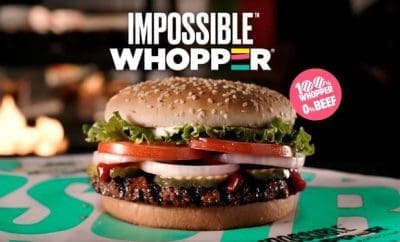THEY might be plant-based, gluten-free, organic and vegan, but many meat-free alternative products are highly processed and packed with salt, recent research has shown, making them more ‘stealthy’ than ‘healthy’.
Some surveys suggest more than 2.5 million Australians now claim to be eating ‘meat-free’ options, and the choice of alternatives such as meat-free bacon, burgers and sausages has almost tripled in supermarkets in less than a decade. But new research has revealed some popular products are hiding up to half a day’s worth of salt in just one serve.

Burger King’s new Impossible Whopper contains a plant-based pattie
But a new report from The George Institute for Global Health, VicHealth and the Heart Foundation revealed meat-free bacon had the highest average amounts of salt (2g salt per 100g), containing well over a third of a day’s worth of salt, followed by falafels (1.3g salt per 100g); meat-free sausages (1.3g salt per 100g), which contained over a quarter. Meat free burgers peaked at 681.7mg of salt per 100g of product.
But it was a vegan pie that took out the saltiest product award, containing half of the daily recommended salt intake in just one serve. The recommended daily maximum for salt intake is less than a teaspoon, or 5 grams, but Australians are consuming nearly double that.[ii]
The average sodium content of ‘meat-free’ products tested was 440mg/100g.
Heart Foundation dietitian Sian Armstrong said the report found high levels of salt in falafels, which is a concern because they are increasingly popular, with five times as many products available in supermarkets now as in 2010 – a growth of 380 per cent.
“Our research showed that there are large ranges in the amount of salt between meat alternative products, but it is possible to choose a healthier item by picking the lower salt option. It also clearly shows that manufacturers can produce products that are much lower in salt,” Ms Armstrong said.
The report analysed the salt content in more than 560 meat alternative products on supermarket shelves from 2010 to 2019.
Key findings:
- Of the 190 products surveyed in 2019, the highest average salt content was in meat-free bacon (2g salt per 100g), followed by falafels (1.3g salt per 100g) and meat-free sausages (1.3g salt per 100g).
- The number of falafel products increased by 380% between 2010 and 2019 and had the largest range in salt content with Monjay Mezza Traditional Falafel and Spinach Falafel (3g of salt per 100g) 10 times saltier than Naturally Falafel varieties (0.3g of salt per 100g).
- The number of meat-free burger products increased by 289pc between 2010 and 2019, with the Fry’s Family Burgers Quinoa & Brown Rice Protein (1.7g of salt per 100g; 1.4g salt per 80g serve) six times saltier than the Unreal Co. Italian Beefy Burger with onion (0.3g salt per 100g; 0.4g salt per 130g serve).
- The highest salt product per serving was the Bean Supreme Laksa pie, which contained 50pc of an adult’s recommended daily salt intake (2.5g salt per 220g serve).
- On average, flavoured tofu contained nearly 12 times more salt than plain tofu (flavoured tofu: 1g salt vs plain tofu: 0.09g salt).
Salt linked with high blood pressure
Heart Foundation CEO Victoria, Kellie-Ann Jolly, said eating too much salt is linked with high blood pressure, which affects more than six million Australian adults and is a major risk factor for heart attack, stroke and kidney disease.
“The growing number of Australians choosing to eat more plant-based foods is a positive move for health, but it is important that people focus on the quality and sources of plant foods, as some can be highly processed and lacking in nutrients,” Ms Jolly said.
“Meat alternatives such as tofu and falafel can be good protein sources as part of a healthy balanced diet, but with any processed or packaged foods, it’s critical not to rely on words or images that make a product appear healthier than it is. Check the label and pick the less salty option.”
The George Institute’s Senior Public Health Nutritionist and the report’s lead author, Clare Farrand, said reducing salt saves lives and that setting salt targets for the food industry works, but Australia is lagging behind other countries.
“It’s concerning that, in nearly a decade, there has been no change to the salt levels in any of the meat alternative products we looked at, and that new products coming on to the market are so high in salt, despite government commitments to reduce population salt intake,” Ms Farrand said.
“The UK has one of the lowest salt intakes of any developed country, and this has been achieved by setting voluntary salt targets and regular monitoring of the food industry to achieve those targets.
“Salt targets for the food industry in Australia are coming, which is great, but there are no salt targets for meat alternatives, and this will need to be addressed.”
“We want people to remember that meat alternatives like vegan sausages, pies and burgers can be highly-processed treat foods and certainly aren’t something we recommend eating regularly,” VicHealth Acting CEO Dr Lyn Roberts said.
Click here to view the full report from the George Institute for Global Health.
